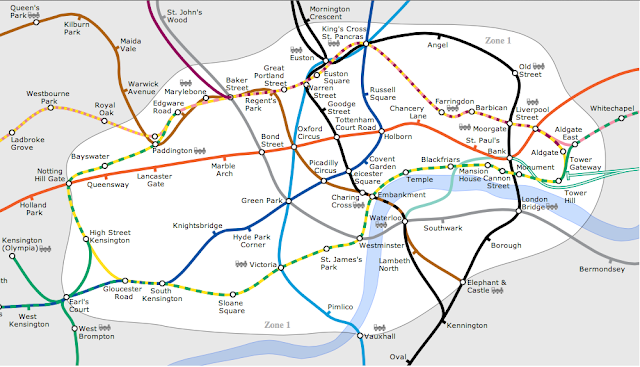Target Audience:
Middle Class Tourists
When the middle class tourists come to London, most of them have:
NO CAR, so they rely on Public Transport or their reliable legs.
*What do there want?*
More enjoyable view.
Interactive with the city.(Nobody come to London because the want to sit in the Tube, they want to see some view, chat with friend, find something interesting on the street, when they find some good shops, they could just stopped and pop into them.)
Low Price Journey, this means
spend less money in travelling
or
live in Zone 2/3/4 then travel to central London by public
If a tourist come to London, one use a tube map would miss a lot of fun by waste the time in the tube.
This is why:
The Realistic Geographical Map is like this:
Distance between Bayswater and Queensway:
Distance between Paddington and Lancaster Gate:
Distance between Bank and Cannon Street:
London Tube Map with Walklines: sometimes it's quicker to walk:
http://rodcorp.typepad.com/rodcorp/2003/10/london_tube_map.html
http://www.phoenixproductions.org.uk/SillyTubeMaps/sillytube.html
What we need to do is:
Find a solution (a new map, an app) to help the tourist realise how could they save time and money by walking to get the destination.
And this is the benefit of the Walking. (from TFL http://www.tfl.gov.uk/gettingaround/walking/2896.aspx)
Walking is quick and reliable
For short journeys, walking is quick and reliable, with very few interruptions. It will always take the same amount of time.
Half of London car journeys are less than 2km, which is just 25 minutes' walk.
If you're out in London, you can use our Legible London maps and signs to get where you're going quickly. Legible London in the Bond Street area has sped up the average walking journey by 16 per cent.
Walking is good for your health
Brisk walking is a great way to clear your head, reduce stress and release those mood-boosting endorphins.
It's the nearest thing to 'perfect' exercise in terms of a safe, all-round workout. And it doesn't cost a penny or need any special equipment.
- If you walk an extra 20 minutes a day, you'll burn off 7lb of body fat a year
- A single step uses up to 200 muscles. So you're not only doing a little cardio, but toning your muscles too
- Walking can halve your risk of coronary heart disease and help prevent some cancers
- Walking may slow cognitive decline in adults, especially those with existing conditions such as Alzheimer's
- Walking can help to prevent the onset of Type 2 diabetes
If you'd like to start walking with a support programme, where you can walk with others, visit Get Walking, Keep Walking.
To find out more about the thousands of great walking opportunities in London, visit Walk4Life.
Walking makes a greener planet
You can breathe in more pollution inside your car than walking the same route.
The average two-way school run emits 800g of carbon dioxide into the air. That's enough to inflate more than 60 balloons.
For every young person walking (instead of being driven) one mile to school and back, we'd save 57kg of carbon per year.
To find out more about swapping the school run for a walk, visit Living Street's Walk to School.
Get a little exercise into your working day, by walking to work or between meetings.
If you want to know how long it would take to walk somewhere, visit Walking Journey Planner or Walkit.com.
Walking is good for London's economy
Walking supports local shops and businesses. Here's the evidence:
- Walking is the second most popular way for Londoners to visit town centres, after taking the bus. It's more popular than the car, train or Tube
- People who walk to town centres spend more per head per month than other shoppers. It's because they linger longer
- Pedestrians are the most frequent visitors to town centres each month. So not only do they spend more money per trip, they visit more often too
- Government research shows that making town centres better for walking can boost trading by up to 40 per cent
- London's annual West End Very Important Pedestrian (VIP) Day in December, when Oxford and Regent Streets close to traffic, increases footfall by up to 40 per cent. Some stores achieve their best sales figures of the year




No comments:
Post a Comment